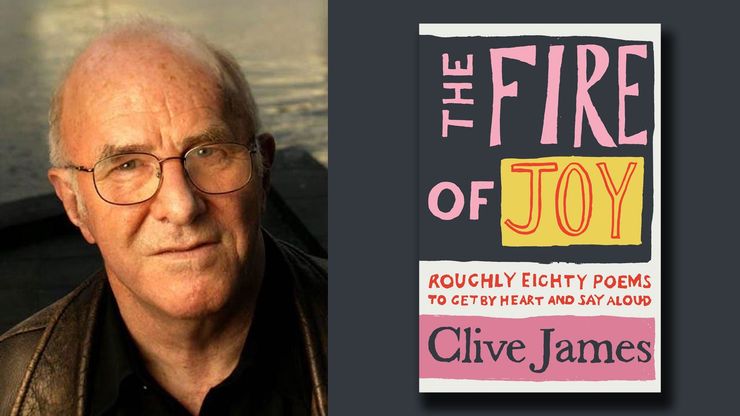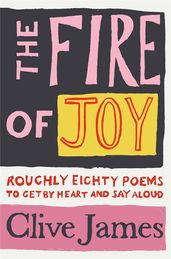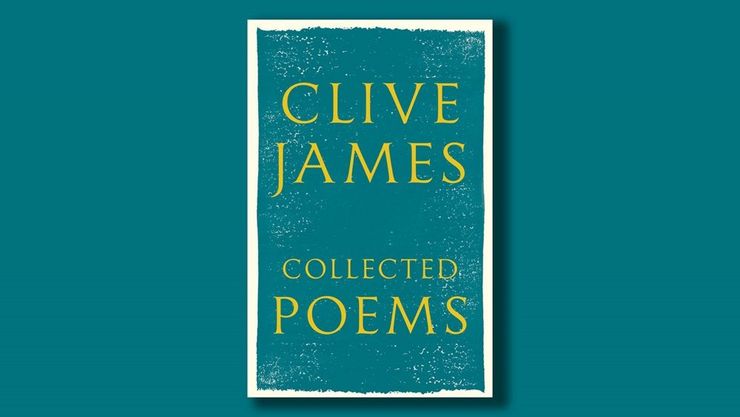Clive James’s favourite poems to read aloud
Clive James spent a lifetime reading, learning and reciting poetry. Here we share his rules for how to read poetry, along with just a few of his favourite poems to read aloud.

Much-loved poet and author Clive James was enthralled by poetry all his life. He knew hundreds of poems by heart, and believed that the best poems are impossible to forget. He also believed that the way a poem sounds is its most important quality, writing in the introduction to The Fire of Joy, completed shortly before his death, that ‘if a poem doesn’t sound compelling, it won’t continue to exist.’ Here, we share just a few of Clive’s favourite poems to read aloud, along with his rules for reciting poetry.
Discover our edit of the best poetry books.
With a poem the most important thing is the way it sounds when you say it. At that rate even the most elementary nursery rhyme has it all over the kind of overstuffed epic that needs ten pages of notes for every page of text, and reduces all who read it to paralysed slumber – or even worse, to a bogus admiration.
My understanding of what a poem is has been formed over a lifetime by the memory of the poems I love; the poems, or fragments of poems, that got into my head seemingly of their own volition, despite all the contriving powers of my natural idleness to keep them out. I discovered early on that a scrap of language can be like a tune in that respect: it gets into your head no matter what. In fact, I believe that is the true mark of poetry: you remember it despite yourself.
The Italians have a word for the store of poems you have in your head: a gazofilacio. To the English ear it might sound like an inadvisable amatory practice involving gasoline, but in its original language it actually means a treasure chamber of the mind. The poems I remember are the milestones marking the journey of my life. And unlike paintings, sculptures or passages of great music, they do not outstrip the scope of memory, but are the actual thing, incarnate. (Taken from the introduction of The Fire of Joy.)
Clive James’s rules for reading poetry aloud
- Go more slowly than you think you need to. It’s because you’re ahead of yourself that you stumble.
- In any regular stanza, pause for the length of a comma at the end of the line to indicate that the line is turning over. If there is already a comma there, pause for the length of two commas. Pause also for two comma lengths at the end of any line ending with a semi-colon, colon or full stop. Pause for at least three comma lengths between stanzas. Don’t be afraid about the pauses losing you the audience. The impetus of the line will keep them listening, whereas a stumble from too much gabble will very soon make them wonder why they didn’t stay at home and watch television.
- Keep your voice up towards the end of the line. There is no point starting a line strongly if you swallow the end of it, and you are more likely to swallow it if you assume that the audience already knows what you are about to say. The audience is not psychic.
- No amount of vocal beauty will compensate for the unfortunate fact that you have no idea what the poem means. Figure it out before you start.
- If you are reading in public, with a microphone, make sure you attend the microphone test, even if it takes place hours before. Nothing ruins a reading more thoroughly than a lot of bang-thump-bang-thump-sorry. Once you are in front of the microphone and speaking, it isn’t necessary to ask the audience if they can hear you. If they can’t, they will tell you.
- Linking patter breaks the mood. Keep it to a minimum, keep it factual and follow the rule of never underestimating the intelligence of the audience, while never overestimating what they know. Don’t upstage your own poetry by making the prose commentary more relaxed and inventive than the poem.
Clive James’s favourite poems to read aloud
Elegy
Chidiock Tichborne 1586
My prime of youth is but a frost of cares,
My feast of joy is but a dish of paine,
My crop of corne is but a field of tares,
And al my good is but vaine hope of gaine.
The day is past, and yet I saw no sunne,
And now I live, and now my life is done.
My tale was heard, and yet it was not told,
My fruite is falne, & yet my leaves are greene:
My youth is spent, and yet I am not old,
I saw the world, and yet I was not seene.
My thred is cut, and yet it is not spunne,
And now I live, and now my life is done.
I sought my death, and found it in my wombe,
I lookt for life, and saw it was a shade:
I trod the earth, and knew it was my tombe,
And now I die, and now I was but made.
My glasse is full, and now my glasse is runne,
And now I live, and now my life is done.
The first word for this poem is ‘fantastic’. Chidiock Tichborne was either only twenty-eight when he was executed for his part in the Babington Plot to assassinate Elizabeth I, or else even younger. He wrote this poem just before he died. Dr Johnson said that when a man knows he is about to die, it concentrates the mind wonderfully. I am bound to say that I have found the opposite. The prospect of my own oblivion helped give me some perspective on just what Chidiock Tichborne achieved during his brief but final time in the Tower. He did it with extreme simplicity of language, as if determined to avoid the metaphysical complexity that was already fashionable. John Donne, for example, might have taken a longer and more twisty path towards clarity. But there is a lot of argument packed into the line about the leaves still being green although the fruit is fallen; it’s a perfect way of saying that your life is over before it has begun. ‘My thred is cut, and yet it is not spunne’ might or might not be an allusion to the three Fates of Greek myth, but it is certainly a chilling way of saying that the speaker is finished before he starts. The true miracle of the poem is that he could see all that and say all that with the axe hanging over his head. Or in fact, something much worse than an axe. They were terrible times, but somehow they produced a purity of language like this.
Not for That City
Charlotte Mew c. 1916
Not for that city of the level sun,
Its golden streets and glittering gates ablaze –
The shadeless, sleepless city of white days,
White nights, or nights and days that are as one –
We weary, when all is said, all thought, all done.
We strain our eyes beyond this dusk to see
What, from the threshold of eternity
We shall step into. No, I think we shun
The splendour of that everlasting glare,
The clamour of that never-ending song.
And if for anything we greatly long,
It is for some remote and quiet stair
Which winds to silence and a space for sleep
Too sound for waking and for dreams too deep.
Some of Charlotte Mew’s best poems are tricky to reprint because she often wrote in long lines. She could afford to do this because she had a faultless sense of rhythm. The only rhythmic glitch in this poem is when she forgets that it has been a long time since the reader saw the first line, so she starts the fifth line (‘We weary . . .’) without the necessary acknowledgement of what we are wearying of. But we can reach a sufficient appreciation of her stately prosodic luxuriance simply by reciting ‘The splendour of that everlasting glare, / The clamour of that never-ending song.’
The metrical progress of her sense of form had the impressive weight of a slowly moving train, but it was a train that was clearly going somewhere, through relished landscapes, searching for stillness and quiet after a long struggle. Born into a family racked by childhood death, insolvency and mental illness, she compensated for the instability by sticking, metrically, to a measured poetic tranquillity that some today might call severe.
Charlotte Mew should be much better known than she is. She had some significant literary champions in her own time, but financial and family troubles continued to dog her, and she was eventually committed to an institution, where she killed herself. A biography like that might enhance the stature of a male poet but she dates from an era when a woman who dressed like W.B. Yeats was unlikely to be given credit for her bardic aspirations, even by W.B. Yeats. (My mental picture of Charlotte Mew is always mixed up with the hushed and mysterious appearances of Miss Froy, the British woman spy in the well-cut tweeds who enlists the aid of Michael Redgrave and Margaret Lockwood in The Lady Vanishes.)
How do I love thee?
Elizabeth Barrett Browning 1850
How do I love thee? Let me count the ways.
I love thee to the depth and breadth and height
My soul can reach, when feeling out of sight
For the ends of being and ideal grace.
I love thee to the level of every day’s
Most quiet need, by sun and candle-light.
I love thee freely, as men strive for right;
I love thee purely, as they turn from praise.
I love thee with the passion put to use
In my old griefs, and with my childhood’s faith.
I love thee with a love I seemed to lose
With my lost saints. I love thee with the breath,
Smiles, tears, of all my life; and, if God choose,
I shall but love thee better after death.
I found her husband Robert Browning first and he was clearly a genius, and at that time I thought of Elizabeth Barrett Browning as being in his shadow. Later on I realised that in fact she was the cure for his blaze of light: a sensible element; a passionate moderation. This is a poem about continual discovery, and embodies the thrill so well that it can be continually rediscovered. Today I look for a line or phrase in this poem to focus on and ‘when feeling out of sight / For the ends of being and ideal grace’ comes shining out. Here, in her quiet way, she’s abandoning her sense of proportion. Excess, at this point, must be the only appropriate level of language, even if we don’t exactly know whether her great love lies there dying or is about to come bounding in with a stack of pastries from the nearby cake shop. Or maybe she’s the one that’s dying. Reading around in the biographical material might give us a more precise idea of the circumstances, but what matters here is that she doesn’t. Everything that’s actually happening is left out. There is only the registration of a mood, and the mood is exaltation mixed with desperation. It’s the best thing life can offer, now that God is out of the picture. He almost is; He is deputed to do the choosing at the end, but His saints have already gone; they were figments of her childhood’s faith, and now she no longer believes all that. Or rather, she no longer believes most of that. Yet there is still a manifestation of the divine for her to have faith in. There’s this chap, and how she loves him. How much? Tell him again.
The Fire of Joy
by Clive James
This highly personal anthology is a collection of Clive James’s favourite poems, poems which he hoped would inspire the reader to discover and learn, and perhaps even speak poetry aloud. Each poem is accompanied by a commentary from Clive which conveys both his enthusiasm and the benefit of his knowledge. Completed just before his death, his urgent wish was to share with a new generation the poetry that he had loved.



